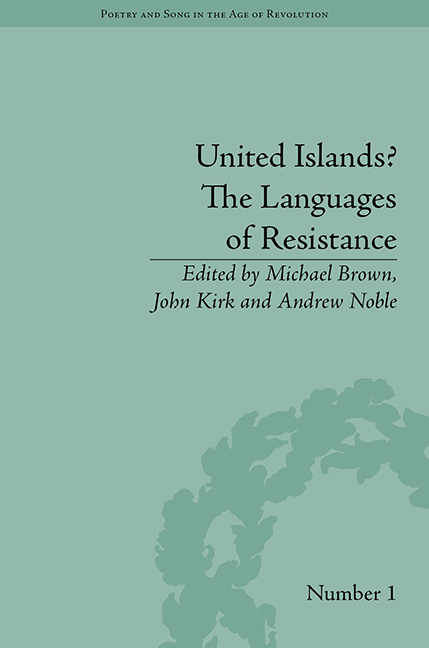Book contents
- Frontmatter
- CONTENTS
- Acknowledgements
- List of Figures and Tables
- List of Contributors
- Introduction: The Languages of Resistance: National Particularities, Universal Aspirations
- 1 Reading the English Political Songs of the 1790s
- 2 Why should the Landlords have the Best Songs? Thomas Spence and the Subversion of Popular Song
- 3 ‘Bard of Liberty’: Iolo Morganwg, Wales and Radical Song
- 4 Canonicity and Radical Evangelicalism: The Case of Thomas Kelly
- 5 Charlotte Brooke's Reliques of Irish Poetry: Eighteenth-Century ‘Irish Song’ and the Politics of Remediation
- 6 Homology, Analogy and the Perception of Irish Radicalism
- 7 Lost Manuscripts and Reactionary Rustling: Was there a Radical Scottish Gaelic Poetry between 1770 and 1820?
- 8 Virile Vernaculars: Radical Sexuality as Social Subversion in Irish Chapbook Verse, 1780–1820
- 9 Thomas Moore and the Problem of Colonial Masculinity in Irish Romanticism
- 10 Radical Politics and Dialect in the British Archipelago
- 11 ‘Theaw Kon Ekspect No Mooar Eawt ov a Pig thin a Grunt’: Searching for the Radical Dialect Voice in Industrial Lancashire and the West Riding, 1798–1819
- Afterword: The Languages of Resistance
- Notes
- Works Cited
- Index
8 - Virile Vernaculars: Radical Sexuality as Social Subversion in Irish Chapbook Verse, 1780–1820
- Frontmatter
- CONTENTS
- Acknowledgements
- List of Figures and Tables
- List of Contributors
- Introduction: The Languages of Resistance: National Particularities, Universal Aspirations
- 1 Reading the English Political Songs of the 1790s
- 2 Why should the Landlords have the Best Songs? Thomas Spence and the Subversion of Popular Song
- 3 ‘Bard of Liberty’: Iolo Morganwg, Wales and Radical Song
- 4 Canonicity and Radical Evangelicalism: The Case of Thomas Kelly
- 5 Charlotte Brooke's Reliques of Irish Poetry: Eighteenth-Century ‘Irish Song’ and the Politics of Remediation
- 6 Homology, Analogy and the Perception of Irish Radicalism
- 7 Lost Manuscripts and Reactionary Rustling: Was there a Radical Scottish Gaelic Poetry between 1770 and 1820?
- 8 Virile Vernaculars: Radical Sexuality as Social Subversion in Irish Chapbook Verse, 1780–1820
- 9 Thomas Moore and the Problem of Colonial Masculinity in Irish Romanticism
- 10 Radical Politics and Dialect in the British Archipelago
- 11 ‘Theaw Kon Ekspect No Mooar Eawt ov a Pig thin a Grunt’: Searching for the Radical Dialect Voice in Industrial Lancashire and the West Riding, 1798–1819
- Afterword: The Languages of Resistance
- Notes
- Works Cited
- Index
Summary
One of the least explored and potentially most interesting areas of late eighteenth- and early nineteenth-century Irish writing is the vernacular poetry found in its printed verse chapbooks. These chapbooks are fragile items – folded half sheets, poorly printed on cheap paper by Irish jobbing printers (mostly in provincial towns like Monaghan, Limerick and Strabane) and sold by chapmen throughout the countryside; most (probably over 99 per cent) of them have long since disappeared, but several hundred of them have, somehow, survived and they give us, between them, a fascinating glimpse of what was sung and recited to Irish town and country audiences between about 1780 and about 1820. The song chapbooks are particularly unusual in that their contents were not copied from one printed text to another but taken down, at dictation, by compositors for whom the singer would recite the words. Thus what we have is the unedited, unabridged, uncensored, unadulterated texts of what was actually sung in rural Ireland during a period of social (as well as political) upheaval.
This material is in English – or rather in Hiberno-English – though some songs contain passages in a phonetically rendered form of Irish. Though everyone concerned with these songs would have been functionally bilingual – that is, able to understand and to speak both English and Irish – few (if any) of them, poets, compositors, printers, chapmen or eventual purchasers, would have been able to read or write the Irish language correctly or with any facility, despite the fact that material in Irish was widely disseminated orally throughout Ireland.
- Type
- Chapter
- Information
- United Islands?The Languages of Resistance, pp. 141 - 152Publisher: Pickering & ChattoFirst published in: 2014



